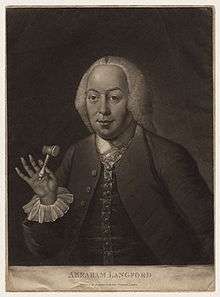Abraham Langford
Abraham Langford (1711–1774) was an English auctioneer and playwright.

Life
He was born in the parish of St Paul, Covent Garden. As a young man he wrote for the stage, and was responsible, according to the Biographia Dramatica, for an 'entertainment' called 'The Judgement of Paris,' which was produced in 1730. In 1736 appeared a ballad-opera by him entitled 'The Lover his own Rival, as formed at the New Theatre at Goodman's Fields.' It was received indifferently, but was reprinted at London in 1753, and at Dublin in 1769.
By 1747 Langford was in partnership with Christopher 'Auctioneer' Cock (d. 1748),[1] and in 1748 succeeded him at the auction-rooms in the north-eastern corner of the Piazza, Covent Garden. These rooms formed part of the house where Sir Dudley North died in 1691, and were later the site of the Tavistock Hotel.
He died on 17 September 1774, and was buried in Old St. Pancras churchyard, near the north wall of the church. A long and epitaph was inscribed on both sides of his tomb. He left a large family.
Langford's successors at the Covent Garden auction-rooms included Henry Robins, father of another well-known auctioneer, George Henry Robins.[2]
References
 "Langford, Abraham". Dictionary of National Biography. London: Smith, Elder & Co. 1885–1900.
"Langford, Abraham". Dictionary of National Biography. London: Smith, Elder & Co. 1885–1900.
Notes
- ↑ http://www.npg.org.uk/research/programmes/directory-of-british-picture-restorers/british-picture-restorers-1630-1950-c.php
- ↑
 "Robins, George Henry". Dictionary of National Biography. London: Smith, Elder & Co. 1885–1900.
"Robins, George Henry". Dictionary of National Biography. London: Smith, Elder & Co. 1885–1900.
- Attribution
![]() This article incorporates text from a publication now in the public domain: "Langford, Abraham". Dictionary of National Biography. London: Smith, Elder & Co. 1885–1900.
This article incorporates text from a publication now in the public domain: "Langford, Abraham". Dictionary of National Biography. London: Smith, Elder & Co. 1885–1900.